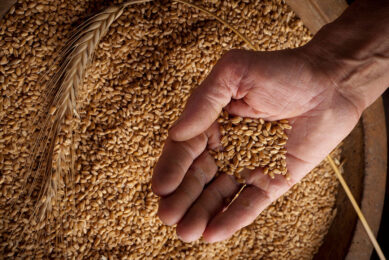Wheat quotations drop below €400 limit

Grain prices in international markets fell early this week after Russian President Putin indicated he is willing to facilitate “unfettered” grain exports from Ukrainian ports in consultation with Turkish partners.
This was reported by the Reuters news agency. Putin has also indicated that if sanctions are lifted, Russia could export “significant amounts” of fertilisers and agricultural products.
Expiring contract higher than last year
The first milling wheat contract to expire (September) on the futures market in Paris closed on 31 May at € 392.50 per tonne. At the beginning of May, this quotation was also below € 400. The first contract to expire is still 83% higher than a year earlier.
Potential for more grain imports lowers price
The news of possibly more grain exports from Ukraine and Russia is also causing prices to fall on the physical markets. Earlier this week, the Rotterdam grain exchange traded € 21.50 lower for EU feed wheat at € 396.50 per tonne.
Tender from Egypt
On the international stage, Egypt has immediately taken advantage of the lower price level and launched new tenders for delivery between 20 and 31 July and delivery between 1 and 10 August.
Corn prices under pressure
International corn prices are also under some pressure, but are less volatile than wheat prices. This reduces the price difference between wheat and maize. The price pressure is partly due to the fact that 86% of the sowing work in the United States has been completed. The 5-year average is 87%. With that, the delay has almost been made up.
Concerns about 2nd Brazilian corn crop
In addition, China has agreed an import agreement with Brazil. On the other hand, there are concerns about the second Brazilian corn crop (safrinha), because it is dry in the important production areas. The safrinha corn is sown after soybeans.











